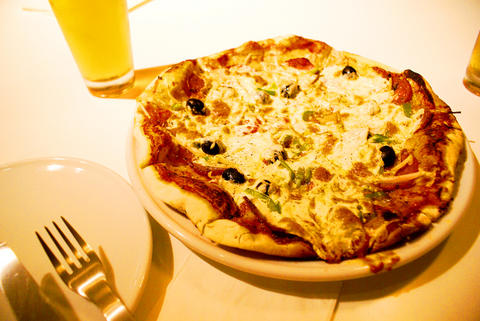Woolloomooloo means "bountiful harvest," or, as Jimmy Yang (楊啟鉉), the laid back proprietor and chef of the cafe bearing the Aboriginal name, says, "Dude, there is a lot of fish here." It's also the name of a recently gentrified area of Sydney, Australia, that features European-style cafes and is the inspiration for the architect's labor of love.
"All architects dream of opening a cafe," said Yang, who lived in Melbourne for 20 years.
Opened six months ago, the cafe is situated on a quiet street close to Taipei Songshan Airport, and a 10-minute walk from the Zhongshan Junior High School (中山國中) MRT station.

PHOTO: NOAH BUCHAN, TAIPEI TIMES
Woolloomooloo has a modern, chic decor. The exposed cement floors and whitewashed walls and wooden tables and shelves are complimented by soft track lighting. Two-thirds of the eating area is given over to two large tables - one square, the other rectangular. Yang has spaced the chairs far enough apart that different parties can dine at the same table without fear of disturbance. On weekends, however, the two tables are often packed with larger parties sipping wine and eating cheese and salami (NT$150 for two up to NT$450 for six).
The other third consists of five two-seater tables and is separated by a standup bar with stools. Large picture windows provide soft natural lighting during the day and glimpses of the tree-lined street.
Apart from the atmosphere, regulars come to sample the limited but mouth-watering menu of drinks and food. There is an emphasis on coffee (NT$100 to NT$150) - the beans are flown in weekly by Tobys Estate, an Australian coffee company - as Yang thinks it's difficult to find a good cup of coffee in Taipei.
"Too often restaurants serve coffee that isn't fresh because it's shipped rather than flown to Taiwan," he said.
Yang stocks a wide range of Australian bottled beers including the popular Crown (NT$200) and a selection of ales by Coopers (NT$150). The wine list is Australian and ranges from NT$1,300 to NT$3,400 per bottle. Glasses of house wine are a bit pricey at NT$230 for the white and NT$250 for the red.
Where he can, Yang makes all his dishes from scratch. The dough used in the pizza is made the day before and is rolled and topped at the time of ordering. His pasta dishes (NT$180 to NT$260) are all made using fresh pasta ordered from a local company, who makes all their pasta using organic semolina flour imported from Australia.
As for the food, the pizza with salami (NT$450) is one of the best in town. It came loaded with mozzarella, fresh slivers of green peppers and onions, whole olives (with the pits) and generous portions of salami. The sauce was rich with tomatoes and spices and the thin crust was cooked so that it was crispy outside.

Towering high above Taiwan’s capital city at 508 meters, Taipei 101 dominates the skyline. The earthquake-proof skyscraper of steel and glass has captured the imagination of professional rock climber Alex Honnold for more than a decade. Tomorrow morning, he will climb it in his signature free solo style — without ropes or protective equipment. And Netflix will broadcast it — live. The event’s announcement has drawn both excitement and trepidation, as well as some concerns over the ethical implications of attempting such a high-risk endeavor on live broadcast. Many have questioned Honnold’s desire to continues his free-solo climbs now that he’s a

As Taiwan’s second most populous city, Taichung looms large in the electoral map. Taiwanese political commentators describe it — along with neighboring Changhua County — as Taiwan’s “swing states” (搖擺州), which is a curious direct borrowing from American election terminology. In the early post-Martial Law era, Taichung was referred to as a “desert of democracy” because while the Democratic Progressive Party (DPP) was winning elections in the north and south, Taichung remained staunchly loyal to the Chinese Nationalist Party (KMT). That changed over time, but in both Changhua and Taichung, the DPP still suffers from a “one-term curse,” with the

Lines between cop and criminal get murky in Joe Carnahan’s The Rip, a crime thriller set across one foggy Miami night, starring Matt Damon and Ben Affleck. Damon and Affleck, of course, are so closely associated with Boston — most recently they produced the 2024 heist movie The Instigators there — that a detour to South Florida puts them, a little awkwardly, in an entirely different movie landscape. This is Miami Vice territory or Elmore Leonard Land, not Southie or The Town. In The Rip, they play Miami narcotics officers who come upon a cartel stash house that Lt. Dane Dumars (Damon)

Jan. 26 to Feb. 1 Nearly 90 years after it was last recorded, the Basay language was taught in a classroom for the first time in September last year. Over the following three months, students learned its sounds along with the customs and folktales of the Ketagalan people, who once spoke it across northern Taiwan. Although each Ketagalan settlement had its own language, Basay functioned as a common trade language. By the late 19th century, it had largely fallen out of daily use as speakers shifted to Hoklo (commonly known as Taiwanese), surviving only in fragments remembered by the elderly. In